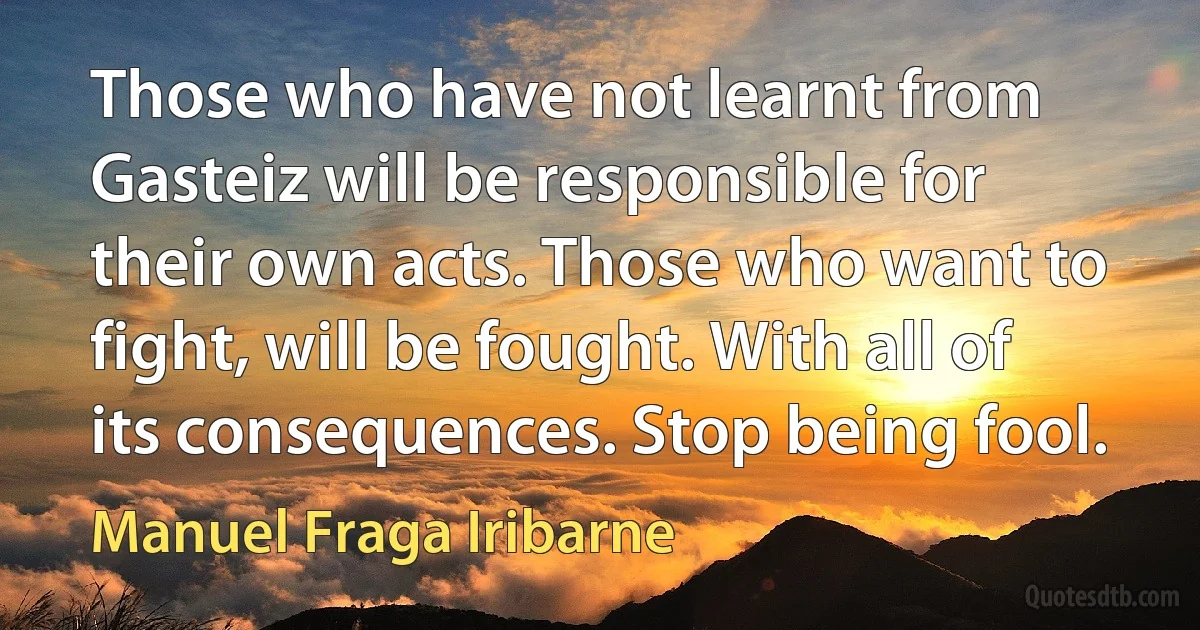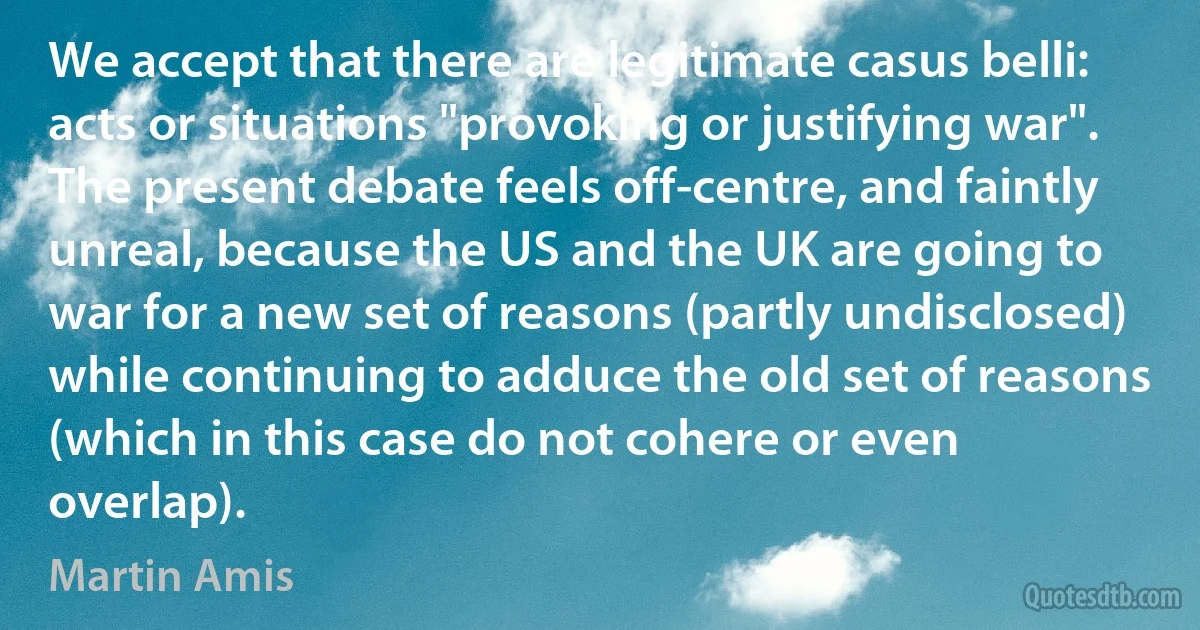Acts Quotes - page 20
[Claude Lelouch] has always told me : "Madame, you shall be my widow!" I married him thinking that he had learned something from life. Big mistake: he gets married and sires children like he drinks a glass of water! ... Claude is a man with an oversized ego. Just as he wishes to always be the master of the situation, he acts like a dictator and everyone has to agree with him. I, on the contrary, always told him the truth...

Alessandra Martines
The language becomes entirely perverted where Eichmann turns metaphors on their heads, talking about expulsion and murder using gentle images of life. An institution for forced emigration was his "first child," where he was able to "be creative in my work." All the individual acts of robbery and expulsion that took place in Austria were committed to "provide [the country] with injections of Jewish solutions." Even exterminations and deportations were "born". This was why he felt so superfluous in Budapest, when he was forced to stop deporting people to Auschwitz: "As far as I know, I couldn't have done anything fruitful anymore" ... In Eichmann's language, he didn't send people to the death camps; the camps were "fed with material".

Adolf Eichmann
But understanding and explaining motives does not compromise freedom; nor does even predicting acts necessarily do so. A person committed to a political cause may vote predictably, and intelligibly in an election. He does not vote less freely than someone that flips a coin at the last minute. So if we find comparison with animals any help in understanding motives, it will not mean that conduct is not free. And since animals are not (as Descartes supposed) automata, the issue of freedom does not make comparing man with any other species and downgrading irrelevance.

Mary Midgley
Why could the typical investor expect any better success in trying to buy at low levels and sell at high levels than in trying to forecast what the market is going to do? Because if he does the former he acts only after the market has moved down into buying levels or up into selling levels. His role is not that of a prophet but of a businessman seizing clearly evident investment opportunities. He is not trying to be smarter than his fellow investors but simply trying to be less irrational than the mass of speculators who insist on buying after the market advances and selling after it goes down. If the market persists in behaving foolishly, all he seems to need is ordinary common sense in order to exploit its foolishness.

Benjamin Graham
She always had been in touch with something outside of human ken. She had something in her no other human had. You sensed it, but you could not name it, for there was no name for this thing she had. And she had fumbled with it, trying to use it, not knowing how to use it, charming off the warts and healing poor hurt butterflies and only God knew what other acts that she performed unseen.

Clifford D. Simak
There is probably no more abused a term in the history of philosophy than "representation,” and my use of this term differs both from its use in traditional philosophy and from its use in contemporary cognitive psychology and artificial intelligence.... The sense of "representation” in question is meant to be entirely exhausted by the analogy with speech acts: the sense of "represent” in which a belief represents its conditions of satisfaction is the same sense in which a statement represents its conditions of satisfaction. To say that a belief is a representation is simply to say that it has a propositional content and a psychological mode.

John Searle
Everywhere, no matter what the sphere of interest (whether religious, political, or personal), the really creative acts are represented as those deriving from some sort of dying to the world; and what happens in the interval of the hero's nonentity, so that he comes back as one reborn, made great and filled with creative power, mankind is also unanimous in declaring. We shall have only to follow, therefore, a multitude of heroic figures through the classic stages of the universal adventure in order to see again what has always been revealed. ...the singleness of the human spirit in its aspirations, powers, vicissitudes, and wisdom.

Joseph Campbell
They were brought out of Africa and into chains in America. Or they were born into slavery here. Yes, I am talking about the first African-Americans to reach these shores, but I am also describing the animals now enslaved in circuses. The species and continents are different, but the stories are tragically similar. The animals in circuses are held against their will by chains and domination. They are forced to perform a series of acts by coercion and violence because they would never normally do these things on their own. They can never choose their own partners, their own homes, their own food or have control over any aspect of their lives. I don't care how this is dressed up by promoters with music and lights, it is still slavery.

Richard Pryor
Furthermore, the best way to restore humanity to the position of the children of God through conversion of lineage is through the inter-cultural "exchange” marriage blessing. It is the greatest of moral acts, creating the Heavenly lineage on a whole new level, transcending the walls of race, culture, nationality and religion. It is an act that severs all links of enmity. It is the sacred rite of the conversion of lineage, through which all can be re-created through the True Parents, the King and Queen of Peace, the substantial manifestations of God who enable Him to exercise His providence in the present world.

Sun Myung Moon
In our zeal to kill the enemy, we internally debated the definition of torture. We held individuals at Guantanamo for years without due process. We inexplicably turned a blind eye to torture and executions by the Iraqi government. And we stomached countless other acts in the name of our war on terror.

Chelsea Manning
Flesh is our indisputable commonality. Whatever our race, our religion, our politics we are faced every morning with the fact of our bodies. Their frailties, their demands, their desires. And yet the erotic appetites that spring from - and are expressed through - those bodies, are so often a source of bitter dissension and division. Acts that offer a glimpse of transcendence to one group are condemned by another. We are pressured from every side - by peers, by church, by state - to accept the consensual definition of taboo; though so often what excites our imaginations most is the violation of taboo.

Clive Barker
In advanced capitalism it expresses the fundamental contradiction between, on the one hand, the increasing socialisation of consumption, and on the other hand, the capitalist logic of the production and distribution of its means of consumption, the outcome of which is a deepening crisis in this sector at the same time as popular protest demands an amelioration of the collective material conditions of daily existence. In an attempt to resolve these contradictions and their resulting conflicts, the state increasingly intervenes in the city; but, as an expression of a class society, the state in practice acts according to the relations of force between classes and social groups, generally in favour of the hegemonic fraction of the dominant classes.

Manuel Castells
The constitution is either a superior paramount law, unchangeable by ordinary means, or it is on a level with ordinary legislative acts, alterable when the legislature shall please to alter it. It is emphatically the province and duty of the judicial department to say what the law is. This is the very essence of judicial duty.

John Marshall
The powers of the legislature are defined, and limited; and that those limits may not be mistaken, or forgotten, the constitution is written. To what purpose are powers limited, and to what purpose is that limitation committed to writing, if these limits may, at any time, be passed by those intended to be restrained? The distinction, between a government with limited and unlimited powers, is abolished, if those limits do not confine the persons on whom they are imposed, and if acts prohibited and acts allowed, are of equal obligation. It is a proposition too plain to be contested, that the constitution controls any legislative act repugnant to it; or, that the legislature may alter the constitution by an ordinary act.

John Marshall
It is admitted that the power of taxing the people and their property is essential to the very existence of Government, and may be legitimately exercised on the objects to which it is applicable, to the utmost extent to which the Government may choose to carry it. The only security against the abuse of this power is found in the structure of the Government itself. In imposing a tax, the legislature acts upon its constituents. This is, in general, a sufficient security against erroneous and oppressive taxation. The people of a State, therefore, give to their Government a right of taxing themselves and their property, and as the exigencies of Government cannot be limited, they prescribe no limits to the exercise of this right, resting confidently on the interest of the legislator and on the influence of the constituent over their representative to guard them against its abuse.

John Marshall



